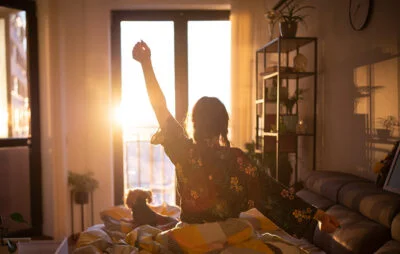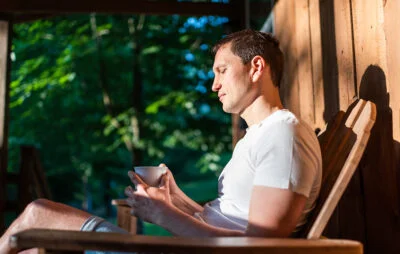
Whenever Daylight Saving Time or the return to Standard Time rolls around, the importance of natural light resurfaces in the popular conversation, especially as the debate continues about whether we should do away with daylight saving time or make it permanent — even at the highest levels of American politics.
You have likely heard that sunshine is good for you, or maybe you just intuited the knowledge yourself from feeling down on cloudy days and exuberant on sunny ones. Many people experience seasonal depression in the fall and winter, due to the increased hours of darkness. And in parts of the world where constant darkness defines winter months, such as Northern Europe, light therapy products have gained popularity to ease the difficulties of dark months.
I’ve certainly experienced these differences myself — I frequently joke that I’m a plant, requiring sunlight to live. However, it’s not just during the winter months that daylight is important for our health. And natural light does more for us than just keeping us feeling sunny; it actually helps us sleep better.
Natural Light Exposure And The Circadian Rhythm

Exposure to light during the day is key to a healthy circadian rhythm, which is the body’s internal clock regulating the sleep and wake cycle over 24 hours. Our brains use daylight and darkness to regulate this cycle — light means its daytime (time to be alert!) and dark means it’s nighttime (time to get sleepy).
However, we don’t always experience these natural cycles of light. After spending hours of the day indoors and away from the sun, and in bright, artificial light at night, our brains can become confused about when to be asleep and when to be awake.
In her book Hello Sleep, Jade Wu, PhD, DBSM, describes how this “circadian dysregulation” makes it hard to fall asleep at night and leads to fatigue during the day. It’s easy for this dysregulation to happen — particularly in the circumstances of our modern world.
If you work nights or rotating shifts, frequently fall asleep and wake at inconsistent times, spend a lot of time indoors, are very sedentary during the day, or have other schedule inconsistencies, Wu notes it is easy for your brain to become confused about the time of day.
Wu, a board-certified sleep psychologist and researcher at Duke University, prescribes three steps to regulate your circadian rhythm in her book: 1) getting lots of bright light during the day (particularly in the morning), 2) embracing darkness at night with dim lighting only and 3) overall creating a contrast for yourself between day and night.
However, considering the busy or irregular schedules that keep so many people from healthy circadian regulation, just knowing that sunlight is important won’t necessarily make it easier for you to get the exposure you need. To help you out, I’ve compiled a list of ideas for ways to get natural light (or the next best thing — light therapy) during your day.
How To Get More Light During The Day

Sit By A Window
It might sound silly, but something as simple as sitting near a window can quickly increase your exposure to sunlight. Try opening the blinds in your bedroom as you get ready in the morning or sitting by a window (or even outside!) as you drink your morning cup of joe or eat breakfast.
If you work from home or have access to a window in your workplace, try setting up your workstation so that you are closer to that window. Or even if you can’t sit by the window all day, try to find a spot with access to bright light when you have a break during the day.
Dr. Shelby Harris, licensed clinical psychologist and director of sleep health at Sleepopolis, says you can even try substituting that afternoon cup of coffee for 20 minutes of bright light, which can be “just as alerting.” Harris says to “try to be mindful about eating your lunch not at your desk,” instead, “sitting by a window [or] going outside, taking a little break then.”
Go For A Walk
Heading outdoors for a walk combines two actions in one to promote a healthy circadian rhythm: exposure to natural light and movement.
Chester Wu, M.D. (no relation to Jade Wu) recommends that you “go for a 10-minute walk as soon as you can after you get up.” He advises not wearing sunglasses, unless it is excessively bright out and if it’s cloudy, try extending your walk five to 10 minutes to ensure you soak up the benefits.
If a morning walk just isn’t in the cards for you, don’t sweat it. It’s still better to get some outside time rather than none, so squeeze a walk in whenever you have the time. Maybe commit to a leisurely stroll after work around your neighborhood or nearby your workplace before beginning your evening routine. Or if you have a long enough lunch break, try getting a walk in then.
Speaking from personal experience, I love going for walks whenever I get the chance. While I’m not usually an early-enough riser to get a walk in the morning, I frequently head outside for a walk around lunchtime. As someone who works a lot from home, I find it helpful to get some sunshine and fresh air during the day. It sounds simple, but it helps!
Exercise Outdoors
Much like going for a walk, exercising outside gives you the double whammy benefits of movement and natural light. Exercising doesn’t just have to be at the gym — get creative! There are tons of physical activities you can do outside and hey, maybe branching out will help you find a new activity you absolutely love.
There are tons of physical activities that you can do outside, but if you don’t currently have any you do regularly, try to pick something that is easy for you to do, without having to travel or invest in too much equipment. While I’d love to be able to go hiking, kayaking, or skiing every day, it’s just not realistic for most people.
Running is one of the simplest, lowest-barrier-to-entry outdoor activities you can easily start at home. If running isn’t your jam, activities like biking, skateboarding, roller skating/blading, or scootering all are all great options. Or you can even bring your normal exercise routine outside! Who said you can’t do yoga, pilates, lift weights, or other workouts in your backyard, at a park, or even on your apartment’s balcony?
And if you currently belong to a gym or attend any fitness classes, see if any are offered outdoors! My gym offers stationary cycling classes outdoors (weather permitting, of course) and I’ve attended outdoor yoga classes before — you might be surprised what options are available near you.
Walk Or Bike For Transportation
How easy it is to walk or bike in your neighborhood largely depends on where you live, but if you live in a walkable area and are able, consider walking or biking (or scootering, skateboarding, whatever floats your boat) for transportation instead of driving or taking public transportation. This is an easy way to spend some time outside while still accomplishing a necessary task.
If your workplace is nearby, switch to a walk or bike commute. Or you could run errands, like a grocery run or picking up prescriptions, on foot instead of driving.
Work Outside (If You Can)
Most of us spend a large portion of our day working. Depending on your work, you might be able to get some light exposure during your workday by simply changing your location.
See if you can spend part of your workday outside. If you work on a computer, pack up your laptop and sit outside on your porch, at a picnic table, or a coffee shop. If you work in an office, consider scheduling smaller meetings or one-on-one conversations outside or as a walking meeting. If you are a student or have to read something for work, take your studies outdoors.
Plan Social Activities Or Pick Up Hobbies
If you are planning an event with friends or looking for a new hobby, that might be another opportunity to get some daylight. Picking up a hobby that will bring you outside like gardening, photography, fishing, or birdwatching is a great way to ensure you are getting time in the sun, even if you don’t do it every single day.
Similarly, if you are making plans with friends or family, try picking something that will be outside or in a space with great natural light. Look for bars and restaurants with outdoor seating for an after-work happy hour or make plans to go shopping at an outdoor mall.
Just Stand Outside
You might be thinking, “I just don’t have time to do any of this stuff!” That’s totally okay — you can even reap some benefits by literally just standing outside.
“When treating patients with sleep disorders, I advise that they find any opportunities to get some sun, even if just for five minutes,” says Danielle Kelvas, M.D.
Even among the busiest people out there, odds are you have five minutes you can spend outdoors. It doesn’t have to be anything special — you can even go stand outside for five minutes in your pajamas. Something is better than nothing.
Artificial Light Therapy
If none of the tips above work for you, or if it’s winter time and your daylight is severely limited, artificial light therapy can make a good substitute for the real thing.
Sun Lamps
Sun lamps are a type of lamp specifically created to combat a lack of sunlight. Many people use them not only to help regulate their circadian rhythms, but also for seasonal affective depression (SAD), dementia, and sleep disorders.
Chelsie Rohrscheib, Ph.D. in neuroscience, says “If you can’t get sufficient light exposure, consider purchasing a sunlamp with a high lux.” Lux is the unit of measurement for light level intensity, so a higher lux is more intense light. Rohrscheib recommends a light of at least 10,000 lux. Make sure to follow the directions of the lamp as some can be used in different ways. And as always, if using bright light box, get the okay from your eye doctor first.
She says, “During the first half of the day, sit with the lamp on your desk while you work or ensure the lamp is within your line of sight.”
Sunrise Alarm Clock
In a similar vein to the sun lamp, you could try a sunrise alarm clock. These lights, like sun lamps, approximate sunlight, but utilize it to help you wake up in the morning and tend to be more gentle than a light box (meaning less lux).. There are many different types of sunrise alarm clocks, but generally they all do the same thing. The light on the alarm clock gradually brightens leading up to your wake-up time to mimic waking up with the sunrise. Some also dim in the evening leading up to your bedtime.
Sunrise alarm clocks can make a great option for people who have to wake up before sunrise, people with very dark bedrooms, or those who can’t get light therapy during their workday.
(Psst: If you’re looking for a sunrise alarm clock of your own, check out the Hatch Restore — the favorite sunrise alarm clock of Sleepopolis’ own Dr. Harris.)
Light Goggles/Light Glasses
“If you have to be up and about and cannot sit in front of a sun lamp, try UV glasses,” says Rohrscheib. UV glasses, also known as light goggles or light glasses, shine light directly into your eyes. Again, get the okay from your eye doctor before using this.
“These glasses are usually advertised for jet lag, but can also be helpful with seasonal depression and daytime sleepiness,” Rohrscheib says.
Most light glasses aren’t meant to be worn all day — just for a limited amount of time, such as 30 minutes to an hour.
Do I Need To Avoid Blue Light At Night?
It’s become a common sleep hygiene mantra to avoid blue light at night as much as possible to avoid confusing your circadian rhythm. Blue light is part of the spectrum of visible light, with shorter energy waves. It’s the type of light we generally experience during the day (hence why the sky is blue!), as well as from many of our screens.
However, unless you cut out your phone, TV, and computer entirely, odds are you will encounter some blue light at night.
If you spend a lot of time looking at screens at night, blue light-blocking glasses might be helpful to mitigate the impact. But perhaps even more important than eliminating blue light at night is ensuring you get enough of it during the day — ideally from the actual sun.
“Contrary to what you might think, the amount of evening light exposure matters less than the amount of daytime light exposure,” says Chester Wu. He says if we get enough blue light during the day, our brains remember that “photic history” enough to mitigate the blue light from screens.
Jade Wu also emphasizes this point in her book, saying not to worry if you use screens at night. “They actually don’t affect your nighttime melatonin or sleepiness if you’ve gotten lots of bright light exposure during the day. In fact, the brighter your days, the less nighttime light will affect you,” she writes. This is where creating the contrast between day and night becomes important — if you had lots of light exposure during the day, screens aren’t going to undo that, but if you were inside all day without any sunlight exposure (real or artificial), you might feel some effects from screens at night.
TLDR: avoiding blue light at night may be helpful, but don’t beat yourself up if you want to catch up on your favorite TV show in the evenings. With a little extra sunlight during the day, those few hours of night screen time shouldn’t wreck your sleep.
Final Thoughts

Exposure to sunlight has a big impact on our brains and a big impact on our sleep (and if you’re like me, a big impact on your mood). There are lots of ways to incorporate light into your day to help regulate your circadian rhythm, from artificial light therapy products to simply standing outside for a few minutes a day.
If you feel like you are struggling with not feeling sleepy at night or feeling fatigued during the day, give some of these tips a try! Pick something that is doable for you, because the best habits to incorporate are the ones you’ll actually do.
While getting extra sunlight is beneficial, it might not be the panacea for all your sleep problems. If you are struggling with chronic insomnia or experiencing symptoms of a sleep disorder, we always recommend speaking to your doctor or medical provider. There are lots of steps you can take to get better sleep, but some problems need to be addressed by a medical professional.


























